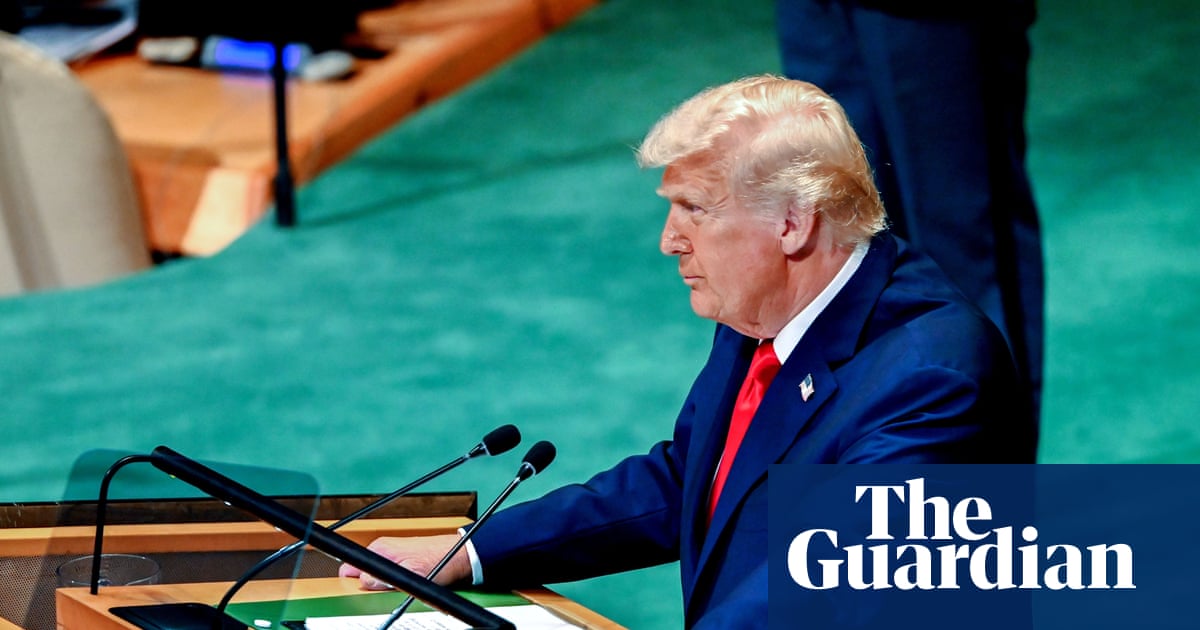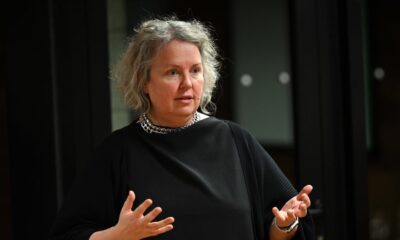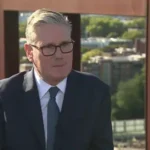Opinion
Trump’s European ‘hell’ is made in America | Letters
Read more on post.

President Trump has told Europe: “Your countries are going to hell” due to immigration (Report, 23 September). It might be the time for someone to remind him that the “hell” is the result of wars in the Middle East, a war in Afghanistan and conflicts in north and east Africa. Iraq, Syria, Lebanon, Libya, Sudan, Eritrea and Afghanistan are some of the countries where the US initiated, funded or clandestinely participated in fomenting mayhem and disaster. And may still be doing so.
How different this action might have been if those countries had overland routes to the US. Instead, it wreaked havoc because it was sitting comfortably 5,000 watery miles away, far from death and destruction. No overland route and no narrow waters for small boats.
Now its president points his finger at Europe and shakes his head in disbelief at the almost unsolvable conundrum we face, which was almost single-handedly created by the US. He and his predecessors are the architects of these disasters. Only someone cerebrally challenged would fail to recognise that and take steps to put it right.
Michael Newman
Shefford, Bedfordshire
In his address to the United Nations general assembly, Donald Trump portrayed climate agreements as a “globalist concept” that forces successful nations to “inflict pain on themselves.” This framing is deeply misleading. The real “pain” comes from failing to act: fires, floods, food shortages and widespread economic disruption are not abstract risks, but lived realities that will worsen without emissions reductions.
International agreements, far from being acts of self-punishment, are acts of solidarity and recognition of common responsibility. Industrialised nations, which built their prosperity on fossil fuels, have both the capacity and the obligation to lead the transition. Far from a burden, this shift is an opportunity – clean energy industries already create millions of jobs while preserving habitability for future generations.
Rejecting cooperation because it is “globalist” ignores the reality that the atmosphere has no borders. A politics of denial and isolation may sound defiant, but it leaves us all weaker in the face of this shared crisis.
Terry Hansen
Milwaukee, Wisconsin, US
Opinion
Careless and damaging talk about autism | Letters
Read more on post.

This week the Trump administration linked paracetamol use in pregnancy to autism (Trump attacks Tylenol as officials unveil highly contentious conclusions on autism, 22 September). We support the position of leading autism organisations – Ambitious about Autism, Autism Alliance, Autistica and the National Autistic Society – which have rightly highlighted that the evidence for such a link is extremely weak, based on poorly conducted studies, and contradicted by high-quality research.
But beyond the question of evidence, we are deeply concerned by the language used. When powerful figures describe autism as a tragedy or something to fear, it reinforces damaging stereotypes. It risks making autistic people feel that their existence is a problem, rather than recognising them as valued members of our communities who bring talent, perspective and diversity.
As a charity that supports disabled people with complex needs, including many autistic people, Sense believes it is vital that leaders, organisations and the media speak responsibly. Words matter. They shape attitudes, influence policy and can either open doors to inclusion or build barriers of stigma and exclusion.
Autistic people and their families deserve respect and acceptance – not blame or shame. We call on those in positions of influence to choose their words carefully.
James Watson-O’Neill
Chief executive, Sense
Autism is not “a condition denoting communication and social difficulties, along with repetitive behaviours”, as your article says – it is a condition that covers an incredibly wide spectrum, which includes feeling things and reacting differently to them compared with non-autistic people.
Autistic people may find socialising tiring, they may become overwhelmed in loud or busy places, they may have intense interests, they may prefer order and routine. And they may not.
I have an autistic child and she is sociable, bright, academically able and empathetic – she doesn’t have communication or social difficulties and no sign of repetitive behaviours.
Pigeonholing autistic people is deeply damaging, reducing complex human beings with unique talents and diverse perspectives to narrow stereotypes that distort how they are perceived and understood.
Name and address supplied
Opinion
Palestinian statehood is more than just a mantra | Letters
Read more on post.

The concerted efforts of the UK, Australia and Canada in recognising Palestine deserve applause (UK recognises state of Palestine to ‘keep alive’ the possibility of peace, 21 September). It is also a moral duty to expose the tendentious and deeply cynical argument that the UK’s recognition of Palestinian statehood is “rewarding” Hamas.
Conflating Hamas with the struggle of Palestinian people is not only incorrect. It displays callousness in the face of the collective punishment and deliberate killing of tens of thousands of Palestinians, many of them women and children, and the accelerated settlement drive in the Palestinian West Bank.
The human cost on both sides is real. All efforts should be focused on ensuring that Jews and Arabs live safely with dignity, free from terrorism, whether perpetrated by individuals, organisations or states.
Palestinian statehood is more than a hollow mantra or political slogan. It requires Palestinian institutions free from corruption, with transparency and accountability upheld to the highest international standards. A successful formula for peace and future stability – with the UK playing its historic role alongside the US and regional powers who have accepted that peace and security for Arabs and Jews is the only way forward.
Lu’ayy Minwer Al-Rimawi
Peterborough
I am a Palestinian, raised and living in Gaza. I obtained a PhD in the UK and in my time there I came to value the friendship of many British people. I also have Jewish acquaintances, some of whom helped me to travel to the UK.
Previously I was a university academic and worked for several universities and international organisations. But in the past two years, I and my children and grandchildren have been forced to flee the places where we were living on 11 successive occasions. Now, we are reduced to surviving in a single tent on an incredibly overcrowded and unhygienic piece of barren ground. All around we have seen countless thousands suffer or die.
It seems especially bizarre that Israel is perpetrating these crimes on the very people who are the closest in origin to themselves. It is clear that our people deserve to have their rights in this land recognised by the international community. Thus I welcome the UK government’s decision to recognise Palestine.
Name and address supplied
The vision of a rebuilt and ethnically cleansed Gaza peddled by Donald Trump (Cartoon, 18 September) and Benjamin Netanyahu’s ally Bezalel Smotrich is not only an outrageous violation of international law but is sickeningly blind to the ghosts of Jewish history.
In 1939 the Nazi masters of the annexed Polish city of Łódź embarked on an ambitious vision for the city’s urban renewal and Germanisation. Led by the urban planner Wilhelm Hallbauer, this now notorious vision foresaw the comprehensive modernisation of infrastructure and urban amenities according to the latest principles of urban renewal, including a large-scale project of demographic engineering.
While the city’s 30% Jewish population was to be ghettoised and eventually “removed”, the city itself, beautified by parks and lakes, was to become a showcase of German culture in the east.
As a historian of Jewish heritage, I can only weep at the historical illiteracy as well as the utter inhumanity of today’s Israeli vision for Gaza.
Jane Caplan
St Antony’s College, Oxford
Opinion
Broken Britain with a Brechtian twist | Brief letters
Read more on post.

I agree with Dr Sebastian Kraemer about the power of drama to counter the rise of reactionary populism (Letters, 24 September). Next year the Royal Shakespeare Company is putting on Brecht’s The Resistible Rise of Arturo Ui, a satirical allegory on the rise of the Nazis, starring Mark Gatiss. If they can record it and put it on TV, it could make an impact to equal that of Mr Bates vs the Post Office.
Priscilla Bench-Capon
West Kirby, Merseyside
The local government secretary suggests transferring responsibility for parts of the struggling NHS to mayors (The Guardian view on Labour’s NHS reforms: where is the plan to deliver them? 23rd September). A hospital pass if ever I saw one.
David Rawlings
Appleton le Moors, North Yorkshire
Regarding cycling essentials (Letters, 24 September), as an 80-year-old experienced club cyclist who prefers to avoid traffic as much as possible these days, I use a lot of paths shared between pedestrians and riders. A free but essential aid, I find, is a loud but polite voice.
Rob Parrish
Starcross, Devon
Your letter writer wouldn’t be without a rear-view mirror. When Geraint Thomas starts using one on his bike, I’ll buy one.
John Kirkwood
Sheffield
I can’t help wondering where the sculptor got their inspiration from for the statue of Donald Trump and Jeffrey Epstein on the National Mall in Washington DC (Report, 24 September). Why did I immediately think of Morecambe and Wise?
David Gordon
Manchester
-
Culture2 days ago
Taylor Swift’s new cinema outing generates more than €12million in just 24 hours
-
Politics2 days ago
European Parliament snubs Orbán with vote to shield Italian MEP from Hungarian arrest
-
Culture2 weeks ago
Life, loss, fame & family – the IFI Documentary Festival in focus
-
Health3 days ago
EU renews support for WHO’s Universal Health Coverage Partnership
-
Culture2 months ago
Fatal, flashy and indecent – the movies of Adrian Lyne revisited
-
Culture2 days ago
Twilight at 20: the many afterlives of Stephenie Meyer’s vampires
-
Environment6 days ago
Key oceans treaty crosses threshold to come into force
-
Culture1 week ago
Farewell, Sundance – how Robert Redford changed cinema forever













































